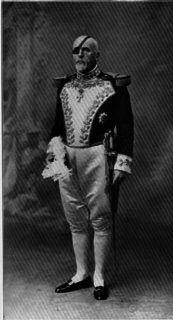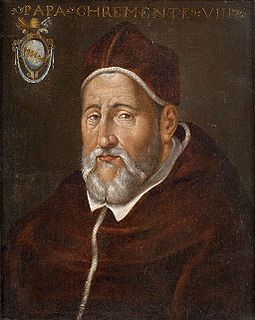
The Princes Torlonia are an Italian noble family from Rome, who acquired a huge fortune in the 18th and 19th centuries through administering the finances of the Vatican. The first influential member of the Torlonia family was Marino Torlonia, who rose from humble origins in the Auvergne region of France to become a very rich businessman and banker in Rome.

A papal conclave is a gathering of the College of Cardinals convened to elect a bishop of Rome, also known as the pope. The pope is considered by Catholics to be the apostolic successor of Saint Peter and earthly head of the Catholic Church.

A Papal Mass is the Solemn Pontifical High Mass celebrated by the Pope. It is celebrated on such occasions as a papal coronation, an ex cathedra pronouncement, the canonization of a saint, on Easter or Christmas or other major feast days.

The Domus Sanctae Marthae is a building adjacent to St. Peter's Basilica in Vatican City. Completed in 1996, during the pontificate of Pope John Paul II, it is named after Martha of Bethany, who was a sibling to Mary and Lazarus of Bethany. The building functions as a guest house for clergy having business with the Holy See, and as the temporary residence of members of the College of Cardinals while participating in a papal conclave to elect a new pope.

The nobility of Italy comprised individuals and their families of the Italian Peninsula, and the islands linked with it, recognized by the sovereigns of the Italian city-states since the Middle Ages, and by the kings of Italy after the unification of the region into a single state, the Kingdom of Italy.
The papal household or pontifical household, called until 1968 the Papal Court, consists of dignitaries who assist the pope in carrying out particular ceremonies of either a religious or a civil character.

Chigi is a Roman princely family of Sienese extraction descended from the counts of Ardenghesca, which possessed castles in the Maremma, southern Tuscany. The earliest authentic mention of them is in the 13th century, with one Alemanno, counsellor of the Republic of Siena.
The Prince Assistant to the Papal Throne was a hereditary title of nobility available in the Papal Court from the early sixteenth century until the reforms of Pontificalis Domus by Pope Paul VI in 1968, when the Papal Court was reformed into the current Papal Household. The title is not currently in use, though it has not been formally suppressed.

The Grand Master of the Sacred Apostolic Hospice, or Quartermaster-General of the Sacred Palaces, is an hereditary official of the Pontifical Household. The title and office became hereditary on June 28, 1808, when Pope Pius VII appointed Prince Francesco Ruspoli as Grand Master.

The black nobility or black aristocracy are Roman aristocratic families who sided with the Papacy under Pope Pius IX after the Savoy family-led army of the Kingdom of Italy entered Rome on 20 September 1870, overthrew the Pope and the Papal States, and took over the Quirinal Palace, and any nobles subsequently ennobled by the Pope prior to the 1929 Lateran Treaty.

Eugène-Gabriel-Gervais-Laurent Tisserant was a French prelate and cardinal of the Catholic Church. Elevated to the cardinalate in 1936, Tisserant was a prominent and long-time member of the Roman Curia.

Luigi Amat di San Filippo e Sorso was the dean of the College of Cardinals during the last part of the record long reign of Pope Pius IX.

Luigi Maria Bilio, C.R.S.P., was a Cardinal of the Roman Catholic Church who, among other offices, was Secretary of the Supreme Sacred Congregation of the Holy Office.

Ruspoli is historically one of the great aristocratic families of Rome, but is originally from Florence. Following World War II and the fall of Fascism, the newly established Italian Republic officially abolished titles and hereditary honours in its 1946 Constitution, with the exception of the papal nobility of Rome, as those titles had been created by papal authority. All of the Ruspoli family's members hold the title of Prince of the Holy Roman Empire.

The 1592 papal conclave elected Pope Clement VIII in succession to Pope Innocent IX.
Benedetto Barberini was a Catholic Cardinal and Camerlengo of the Sacred College of Cardinals.

Pontificalis Domus was a motu proprio document issued by Pope Paul VI on 28 March 1968, in the fifth year of his pontificate. It reorganized the Papal Household, which had been known until then as the Papal Court.

The orders, decorations, and medals of the Holy See include titles, chivalric orders, distinctions and medals honoured by the Holy See, with the Pope as the fount of honour, for deeds and merits of their recipients to the benefit of the Holy See, the Catholic Church, or their respective communities, societies, nations and the world at large.

Marco Antonio Colonna (1523–1597) was an Italian Roman Catholic bishop and cardinal.

The Papal nobility is the nobility of the Holy See.

















